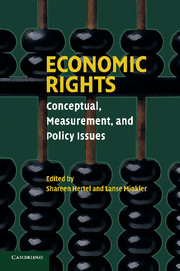Book contents
- Frontmatter
- Contents
- Contributors
- Acknowledgments
- 1 Economic Rights: The Terrain
- SECTION I CONCEPTS
- SECTION II MEASUREMENT
- 7 The Status of Efforts to Monitor Economic, Social, and Cultural Rights
- 8 Measuring the Progressive Realization of Economic and Social Rights
- 9 Economic Rights, Human Development Effort, and Institutions
- 10 Measuring Government Effort to Respect Economic and Social Human Rights: A Peer Benchmark
- 11 Government Respect for Women's Economic Rights: A Cross-National Analysis, 1981–2003
- SECTION III POLICY ISSUES
- APPENDIX 1 Universal Declaration of Human Rights
- APPENDIX 2 International Covenant on Economic, Social, and Cultural Rights
- Index
- References
10 - Measuring Government Effort to Respect Economic and Social Human Rights: A Peer Benchmark
Published online by Cambridge University Press: 18 December 2009
- Frontmatter
- Contents
- Contributors
- Acknowledgments
- 1 Economic Rights: The Terrain
- SECTION I CONCEPTS
- SECTION II MEASUREMENT
- 7 The Status of Efforts to Monitor Economic, Social, and Cultural Rights
- 8 Measuring the Progressive Realization of Economic and Social Rights
- 9 Economic Rights, Human Development Effort, and Institutions
- 10 Measuring Government Effort to Respect Economic and Social Human Rights: A Peer Benchmark
- 11 Government Respect for Women's Economic Rights: A Cross-National Analysis, 1981–2003
- SECTION III POLICY ISSUES
- APPENDIX 1 Universal Declaration of Human Rights
- APPENDIX 2 International Covenant on Economic, Social, and Cultural Rights
- Index
- References
Summary
INTRODUCTION
In 2000, the Organization for Economic Co-operation and Development (OECD), International Monetary Fund (IMF), United Nations, and World Bank published a jointly prepared document titled “A Better World for All” (www.paris21.org/betterworld/home.htm). That document promised substantial progress in reducing world poverty by 2015. The report proposes measuring poverty reduction in seven areas: world poverty (the percentage of people living on the equivalent of one U.S. dollar or less per day), gender gaps in school enrollment, primary school enrollment, infant mortality and maternal mortality, access to health services, and sustainable development. Among other specific goals mentioned in the report, the promises included decreasing rates of infant mortality by two-thirds and maternal mortality by three-fourths, providing access to all that need health service, and ensuring that all children are enrolled in primary school. Taken together, the goals in the report are commonly referred to as the “Millennium Development Goals.”
The language of human rights could have been used to frame the Millennium Development Goals Project. A citizen's rights to a government that will try to offer protections against the ravages of disease, hunger, exposure, and illiteracy are protected in international human rights law. Shue (1980) and Pogge (2006) have even argued that these economic and social rights are the most important of all human rights. Still, policy makers are hesitant to treat such things as an adequate education, health care, housing, and decent employment as proper human rights.
- Type
- Chapter
- Information
- Economic RightsConceptual, Measurement, and Policy Issues, pp. 214 - 232Publisher: Cambridge University PressPrint publication year: 2007
References
- 6
- Cited by



